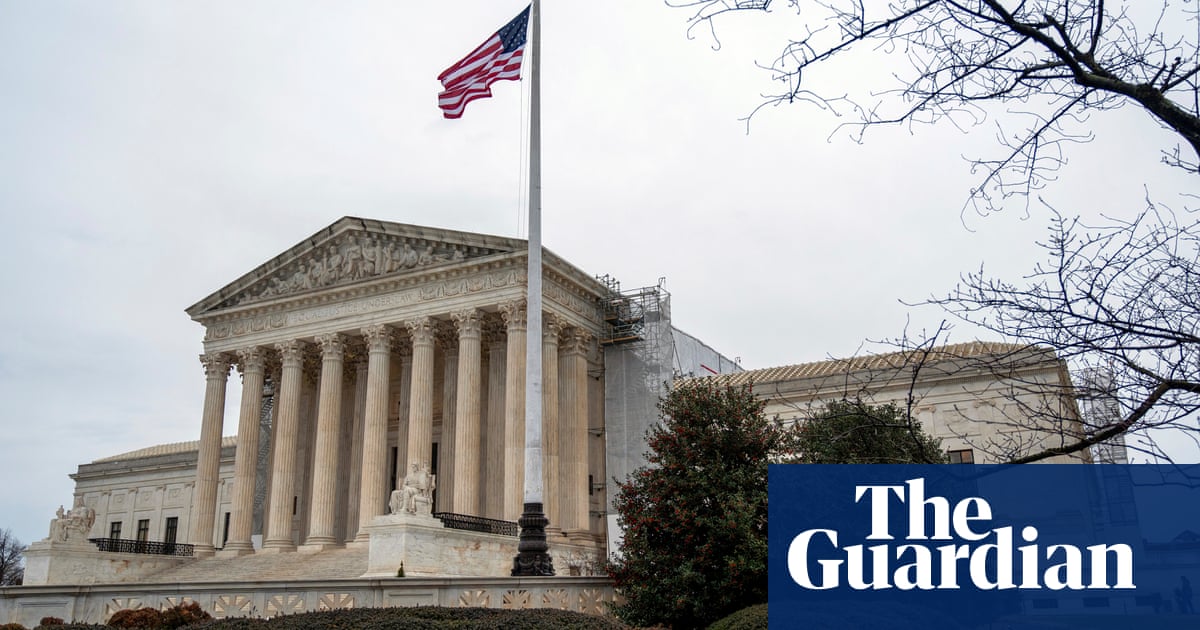The supreme court will hear oral arguments on Monday in Murthy v Missouri, a case with the potential to radically redefine how the US government interacts with social media companies. The suit is the culmination of years of a Republican-backed legal campaign arguing that efforts by federal agencies and Joe Biden’s White House to reduce misinformation online constitute censorship.
Central to the case is whether the White House violated free speech protections during the Covid-19 pandemic, when government officials requested that Twitter, Facebook and other social networks remove misinformation about the coronavirus. The lawsuit accuses the government of “coercing” tech platforms to change their policies, block content and suspend users. The complaint was filed by attorneys general in Louisiana and Missouri as well as rightwing individuals such as the conspiracy theory site founder Jim Hoft. If the courts decide in their favor, the White House would be blocked from contacting social media companies, as happened when a lower court sided with the plaintiffs.
The Biden administration has argued that officials did not coerce or threaten social media platforms. It also argues that federal agencies have routinely communicated with social media platforms about terrorist group organizing or foreign influence campaigns, which has prompted tech companies to voluntarily enforce their own policies that ban such content.
White House argued it made ‘no such threats’
The plaintiffs in the case argue that statements from Biden, the former White House press secretary Jen Psaki and the surgeon general, Vivek Murthy, which called on social media companies to take stronger action against misinformation, amounted to threats against the platforms to enforce censorship. The government has denied that its requests should be seen as threats, saying that officials never implied legal consequences if the companies did not comply.
“No one disputes that the government would have violated the first amendment if it had used threats of adverse government action to coerce private social-media platforms into moderating content,” the White House said in a reply brief. “But no such threats occurred here.”
Experts warn of Murthy v Missouri’s danger to public health
The case will examine the limits of how the government and its agents can exert influence over tech platforms, and what the line is between encouraging a company to take action versus forcing it. Public health officials and experts have expressed fear that, if the suit succeeds, it would allow for the unchecked spread of potentially life-threatening misinformation across social media platforms. The suit would also restrict the government’s ability to address other online falsehoods, including election misinformation.
Multiple medical organizations, including the American Medical Association, previously filed a brief arguing that the government has “a ‘compelling interest’ in fighting vaccine misinformation”, which is “at its simplest, the government trying to prevent factually incorrect statements from costing people their lives”. Several secretaries of state also filed a separate brief arguing that whatever the court decides, it must allow state election officials to communicate with platforms or “risk that dangerous, and even illegal, falsehoods about elections and voting will spread unchecked”.
after newsletter promotion
An Orwellian ‘Ministry of Truth’
Several conservative judges presided over the case on its way to the supreme court. One of the judges to hear the case was Terry Doughty, a Trump appointee in the rural western district court of Louisiana who has become a favorite among Republican attorneys general seeking sympathetic rulings. Doughty, who Bloomberg Law reported has heard the most multi-state challenges against Biden administration policies out of any federal judge, issued a sweeping preliminary injunction that blocked White House officials from having any contact with social media companies. His lengthy ruling accused federal agencies of assuming “a role similar to an Orwellian ‘Ministry of Truth’”.
The ruling came during a wider Republican campaign to push back against attempts to monitor and mitigate online misinformation. Republicans have issued dozens of subpoenas to universities with programs researching disinformation, threatening legal action if they did not hand over communications with the government, while also accusing federal agencies of engaging in censorship of conservative voices.
Following Doughty’s ruling, the conservative US court of appeals for the fifth circuit affirmed part of the injunction and set the stage for the case to make its way to the supreme court. In October of last year, the supreme court put a hold on the lower court’s injunction and allowed government officials to resume their communications with platforms. Three conservative justices, Samuel Alito, Clarence Thomas and Neil Gorsuch, issued a dissent stating that they would have kept the injunction intact.







